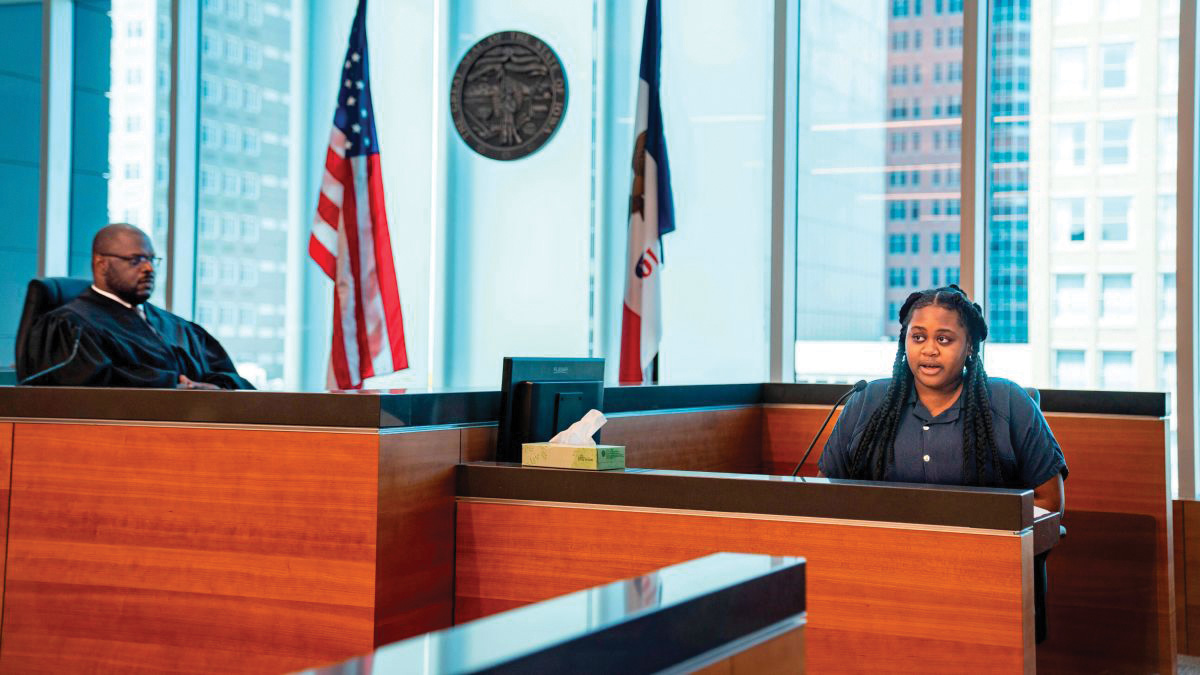Editor’s Note: This article addresses topics like sexual assault, violent crime and drug use.
“I refuse to fail and let the system fail me.” – Pieper Lewis, Sept. 13, 2022.
When Pieper Lewis, a Des Moines, native was 15 years old, she ran away from home after enduring mistreatment and verbal insults by her adoptive mother in the summer of 2020. She was living in the halls of an apartment building complex when she was taken in by a young musician who said he’d take care of her. After giving her a place to stay, he forced her to have sex with him and then put up online ads to be sold into human trafficking. One of the men who she was sold to was Zachary Brooks, a 37-year-old bus driver, a father, who participated in the trafficking and alleged rape of a 15-year-old child. Lewis says that he violated her several times and kept her drugged.
In June of 2020, she stabbed 37-year-old Zachary Brooks, about 30 times after enduring hours of abuse after being forced to drink and use drugs. She pleaded guilty to voluntary manslaughter and was facing up to 20 years in prison at the age of 17. Per Iowa code chapter 910 from 1997, she was also told to pay $150,000 in restitution to Brooks’ family. Despite her being a victim of sex trafficking, no charges were brought up against her trafficker. Lewis got national attention following her sentencing and her high school teacher started a GoFundMe to cover Lewis’s payment to Brook’s family. The GoFundMe ended up reaching three times the $150,000 goal and will allow Lewis the financial freedom to fund her future after doing her time.
Lewis’ story is one of many that show the reality survivors of sex trafficking face and their criminalization by the justice system. Cyntonia Brown-Long was 16 years old when she was charged with life in prison for also killing her abuser. Zephi Trevino was only 16 years old when she was charged with capital murder as an adult by Texas’s district attorney for a crime committed by her trafficker. Joan Little was only 19 when she faced murder charges for killing the officer who attempted to rape her in 1974.
The way her case was handled and the investigation into her claims of sexual abuse speaks to the larger disparity of Iowa’s lack of modernity to sex trafficking crimes.
Sex trafficking victims are being treated more like criminals than the actual people who traffick and participate in their physical, sexual and mental abuse.
The Polaris Project, a nonprofit anti-human trafficking organization, defines human trafficking as “the business of stealing freedom for profit. In some cases, traffickers trick, defraud or physically force victims into selling sex.”
Since 2007, they have operated the National Human Trafficking Hotline and have built the “largest database of human trafficking in North America.” They studied the criminalization of survivors in the National Survivor study. Out of the 439 participants, they found 62% had been arrested at least once and, of that percentage, 80% were arrested while they were being trafficked. The survivors were arrested and charged at “shocking rates.” They speak of the importance of Criminal Records Relief which are policies that protect survivors and prevent the loss of their rights.
Having a criminal record can greatly affect employment, housing applications and one’s access to higher education. Iowa has no haven law that allows for criminal immunity to trafficking victims. Polaris states that currently, survivors need to “prove their worthiness as survivors to clear criminal records.”
Clemency hearings are done for the survivors to apologize and ask for forgiveness of crimes they committed during a time when they were victims themselves to courts, in my opinion, do little to protect and prevent these situations. Why should victims be solely blamed? Why not hold and punish their abusers for putting them in these situations? Why not train police to be able to investigate signs and allegations of trafficking?
Pieper Lewis’ case is a sign we need to look closer at our laws and make sure that they protect survivors of exploitation and abuse, especially when they are facing direct charges due to the circumstances of human trafficking.
Despite the judge going for the minimum and sentencing Lewis to five years probation in a women’s detention center, the system has been and is still flawed for survivors facing criminalization. After she aged out of juvenile detention, Lewis had to be transferred to The Des Moines Fresh Start Women’s Center following her 18th birthday. She obtained her GED during her detention.
Iowa does not have a specific treatment/rehabilitation center for young girls who went through similar experiences to Lewis. Her defense team wanted to transfer her to a girl’s center in Missouri, but Iowa’s Department of Human Services refused due to this only being a last resort and the fees for transferring her out of state.
In an article by The Associated Press, they say “prosecutors took issue with Lewis calling herself a victim” and that she needed to be accountable for “leaving (Brooks) without a father.” It is completely absurd to not count her as a victim considering whether or not Brooks knew about Lewis being trafficked, he allegedly purchased a minor for sex.
What is truly perplexing to me is that her accused trafficker hasn’t been brought to justice for his role in even handing Lewis over to Brooks. He is still a threat to the community and other vulnerable young girls. Yet there’s no word on any arrests.
Lewis gave a nine-minute-long statement in September 2022. Lewis said the support of her team, support system and those who believe in her, along with faith and patience has kept her determined to shine.
“My spirit has been burned, but still glows through the flames,” she read. “Hear me roar, see me glow, and watch me grow.”
She apologized for Brooks’ death and said that she wished it had never come to that point. To the prosecution, she retorted a prior statement and said, “To say there’s only one victim in the story is (absurd).” She said not only did a man die, but her innocence was stolen too. She hopes to be a fashion and graphic designer one day for her brand called ‘Pie.’ She plans to advocate for survivors like her and others in juvenile court. She wants to be a counselor and start her own family one day. “I’m not a stranger to the dark because I’m a light. I am a survivor,” she added.
Her story has been largely covered by Des Moines Register reporter, Philip Jones, who, in two direct interviews, asked Lewis about her life in the detention centers and plans for the future. She explained that despite the resources at her disposal, whenever she needed help outside the resources available to her in the women’s detention center, being the youngest there among women who still had a “criminal lifestyle,” the center “didn’t know how to help her.”
Following a quarantine in the center with limited time and communication with her loved ones and team, she felt like her “flight or fight” responses were turned on due to the isolation and her declining mental state. The Fresh Start Center is the only center in Iowa that is focused on rehabilitation for women who were victims of the circumstances that led them to be prosecuted. She had a job and was allowed to be out in the community during certain periods. She felt like she couldn’t avoid recognition, that a member of Brooks’ family had heckled her at a bus stop and that she had even bumped into her former trafficker.
The center was only one mile away from where she was trafficked. She felt trapped, unsafe, and ran away to a mall in order to gain a sense of normalcy. Much of her teen years were spent detained. She later pleaded guilty to escaping and was offered a “second chance” with no additional sentencing but, “she will not be offered a third” Polk County District Judge David M. Porter said.
In August 2022, the Trafficking Survivors Relief Act was introduced by Republican Utah House Representative Burgess Owens, which would vacate charges of survivors’ criminal record after filing a motion that’s based on clear evidence of trafficking and a rebuttable presumption that the filer was trafficked. There has been no movement of the bill since November of 2022.
If you want to help Pieper Lewis live the life she deserves and achieve her dreams, please sign a petition to get her pardoned by Iowa’s governor Kim Reynolds. Keep up the hope and positivity and learn more about the signs of human trafficking
She’s not the first of many girls to be criminalized despite being a victim of human sex trafficking. But how will she be the last if we do nothing about the laws and systems that allow this criminalization to take place?
What can we do?
Ask Governor Kim Reynolds to pardon Lewis. Sign the petition. Spread the word and learn more about sex trafficking to understand the need to have legislation that protects survivors of human trafficking.
Her story is part of a larger issue of human trafficking and how easy it is for girls like her to slip through the ‘safety net’ of society. She was still in high school when she went to live with her alleged rapist who then took advantage of her and used her as a means to benefit himself.









